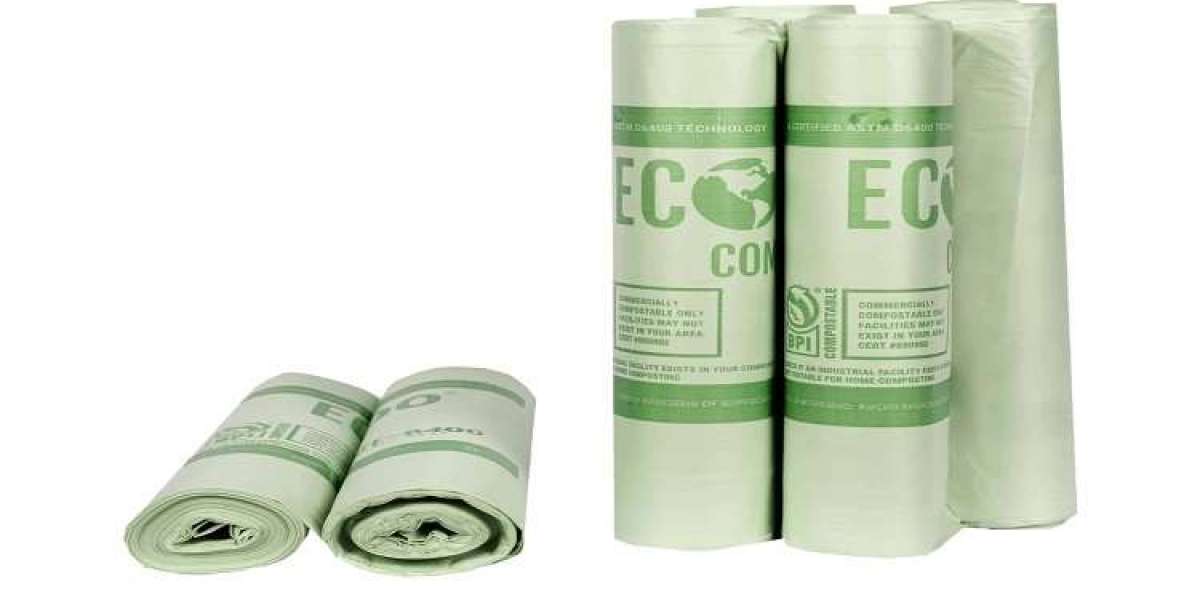Trash bags are an essential part of our daily lives, but have you ever stopped to think about the impact they have on the environment? If you're looking for a more responsible and eco-friendly way to dispose of your garbage, compostable trash bags are here to save the day! These innovative alternatives not only help reduce plastic waste but also contribute to creating nutrient-rich soil. In this blog post, we'll explore what compostable trash bags are, how they differ from biodegradable options, how they work their magic in the compost pile, and most importantly, how to choose the right one for your needs. So let's dive into this green revolution together and make a positive change for our planet!
What are compostable trash bags?
Compostable trash bags are a sustainable and eco-friendly alternative to traditional plastic garbage bags. Made from plant-based materials such as cornstarch, vegetable oils, or other organic matter, these bags are designed to break down naturally in a composting environment.
What sets compostable trash bags apart from their biodegradable counterparts is that they undergo a specific process known as composting. Biodegradable products can break down over long periods of time, sometimes leaving behind harmful residues. Compostable bags, on the other hand, degrade completely into nutrient-rich humus within a shorter timeframe.
When placed in a compost pile or facility where conditions like heat and moisture are present, these bags will begin to decompose. Microorganisms feast upon the organic material of the bag, breaking it down into simpler components that eventually become part of the soil.
Not only do compostable trash bags help divert waste from landfills by turning them into valuable nutrients for plants and crops but they also reduce our overall reliance on plastic. By using these environmentally friendly options in our daily lives, we contribute to preserving natural resources and mitigating pollution caused by conventional plastics.
Choosing the right compostable trash bag for your needs depends on factors such as size requirements, thickness preference (for heavy-duty use), and compatibility with your local waste management system. Look for certifications like "ASTM D6400" or "EN 13432" to ensure that you're purchasing certified compostable products.
So next time you're faced with disposing of your household waste responsibly, consider making the switch to compostable trash bags – it's a small change that can make a big difference for our planet!
What is the difference between biodegradable and compostable trash bags?
When it comes to eco-friendly garbage disposal, you may have come across terms like biodegradable and compostable trash bags. While they both sound similar, there are some important differences between the two.
Biodegradable trash bags are designed to break down over time through natural processes. These bags can decompose into smaller pieces, but they may still leave behind harmful residue in the environment. On the other hand, compostable trash bags are made from organic materials that can fully break down into nutrient-rich compost under specific conditions.
Compostable bags require a controlled environment with proper temperature, moisture levels, and microorganisms to facilitate decomposition. They typically need to be processed at industrial composting facilities rather than home compost piles or landfill sites.
Choosing between biodegradable and compostable trash bags depends on your specific needs and available waste management options. If you have access to an industrial composting facility or participate in municipal food waste collection programs, then using compostable trash bags would be the most environmentally responsible choice.
Remember that simply throwing any type of bag labeled as "biodegradable" or "compostable" into your regular garbage bin will not lead to proper decomposition. It's crucial to follow the recommended disposal guidelines provided by manufacturers for these types of products.
By understanding the difference between biodegradable and compostable trash bags, you can make more informed decisions about how best to contribute to sustainable waste management practices while reducing your environmental footprint.
How do compostable trash bags work?
Compostable trash bags are made from plant-based materials, such as cornstarch or vegetable oils. These materials break down naturally over time, turning into compost when exposed to the right conditions. This means that instead of sitting in a landfill for hundreds of years like regular plastic bags, compostable ones can be broken down and transformed into nutrient-rich soil.
When you dispose of your compostable bag, it's important to make sure it ends up in the proper environment for decomposition. Ideally, these bags should be placed in a municipal or commercial composting facility where they will be subjected to high temperatures and adequate moisture levels. In this controlled setting, microorganisms can get to work breaking down the bag.
While compostable trash bags may take longer to decompose than their biodegradable counterparts (which only break down into smaller pieces), they offer a more sustainable solution for responsible waste management. By using these bags, you're diverting organic waste from landfills and contributing to the creation of valuable compost.
It's worth noting that not all compostable trash bags are created equal. When choosing one for your needs, look for certifications such as "ASTM D6400" or "BPI Certified Compostable." These indicate that the bag meets specific standards for biodegradability and environmental impact.
In conclusion (as requested by instructions), opting for compostable trash bags is a simple yet impactful way to reduce our reliance on single-use plastics and promote more sustainable waste disposal practices. By understanding how these innovative alternatives work and making informed choices about which products we use, we can each play a part in creating a greener future!
How to choose the right compostable trash bag for your needs
When it comes to choosing the right compostable trash bag for your needs, there are a few key factors to consider. First and foremost, you'll want to look for bags that are certified as compostable by reputable organizations such as the Biodegradable Products Institute (BPI) or ASTM International.
Next, think about the size and strength of the bag. Consider how much waste you typically generate and choose a bag that can comfortably hold that amount without tearing or leaking. It's also important to check if the bags have any special features like drawstring closures or odor control.
Another crucial aspect is the material used in making these bags. Look for options made from plant-based materials such as cornstarch or sugarcane rather than traditional plastic. These materials break down more easily during composting and leave behind fewer harmful residues.
Don't forget about cost-effectiveness. While compostable trash bags may be slightly pricier than regular plastic ones, they offer significant environmental benefits. So weigh up these factors carefully when selecting your eco-friendly option!
Remember, finding the right compostable trash bag may take some trial and error, but with a little research and consideration of your specific needs, you'll be able to make an informed choice that aligns with both sustainability goals and practicality!
What should you do if you misplace a compostable trash bag?
Misplacing things happens to the best of us, and compostable trash bags are no exception. So, what should you do if you find yourself without a compostable trash bag when it's time to dispose of your waste responsibly?
Take a deep breath and don't panic. It may seem like a setback, but there are alternatives you can consider in this situation. One option is to use a regular plastic bag that you already have on hand. Although not ideal from an eco-friendly perspective, repurposing an existing plastic bag is still better than throwing your organic waste into the regular garbage.
If using a regular plastic bag isn't possible or desirable for you, another option could be to line your bin with newspaper or other biodegradable materials before placing your waste inside. While this won't provide the same containment as a proper compostable trash bag, it will help prevent any potential messes or odors.
Additionally, try keeping spare compostable bags in various convenient locations around your home or workspace so that you always have one within reach when needed. This way, even if you misplace one bin liner, there will be another readily available.
Remember to make note of where you store your extra bags so that they're easy to locate when required next time. Develop habits such as always putting them back in their designated spot after use.
Consider reaching out to local stores or suppliers who carry compostable products and inquire about their availability near where you live or work. Having multiple sources for purchasing these eco-friendly options ensures that even if one location doesn't have them temporarily, others might.
In conclusion (without actually saying "in conclusion"), misplacing a compostable trash bag is not the end of the world! There are several alternatives and strategies at your disposal (pun intended) for those moments when life throws us off course. By staying prepared and adaptable, we can continue our commitment towards responsible garbage disposal and be kinder to the environment.
Conclusion
Choosing compostable trash bags is a simple yet impactful step towards responsible garbage disposal and environmental sustainability. These eco-friendly alternatives offer numerous benefits over conventional plastic bags, such as reducing waste in landfills and minimizing the release of harmful toxins into the environment.
Compostable trash bags are designed to break down naturally, without leaving behind any toxic residues or microplastics. They are often made from plant-based materials like cornstarch or vegetable oils, which can be easily decomposed in industrial composting facilities.
When selecting a compostable trash bag, consider factors such as size, thickness, and certification. Look for products that meet recognized standards for compostability, such as those certified by organizations like the Biodegradable Products Institute (BPI) or the Compost Manufacturing Alliance (CMA).
If you happen to misplace a compostable trash bag or it ends up in regular waste collection inadvertently, don't fret! While it may not have the desired opportunity to fully decompose in a landfill setting, it will still degrade at a much faster rate than traditional plastic bags. Remember to always dispose of your waste properly and educate others about the importance of sustainable practices.
By opting for compostable trash bags instead of their non-biodegradable counterparts, you are making an active contribution towards creating a healthier planet for future generations. Together, we can reduce our carbon footprint and protect our environment one small but significant step at a time.








